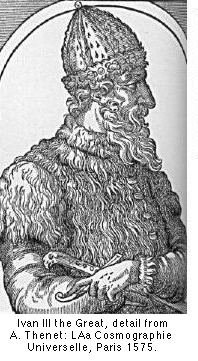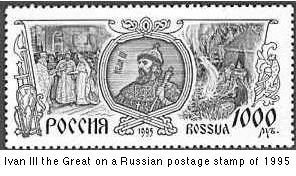Ivan (Vasilyevich) III
(Ivan the Great)
grand prince of Moscow, b. 22 January 1440 (Moscow, Russia), d. 27 October 1505 (Moscow).
 Ivan's father, Grand Prince Vasily II of Moscow, was a descendant of Rurik. At the time of Ivan's birth the Russian state was embroiled in civil war between Vasily and his brothers. When Ivan was six years old his father was arrested and blinded by his cousin; Ivan was hidden in a monastery but soon handed over to his father's captors through an act of treason.
Ivan's father, Grand Prince Vasily II of Moscow, was a descendant of Rurik. At the time of Ivan's birth the Russian state was embroiled in civil war between Vasily and his brothers. When Ivan was six years old his father was arrested and blinded by his cousin; Ivan was hidden in a monastery but soon handed over to his father's captors through an act of treason.
Ivan and his father were released in the same year (1446), and his father decided to gain political support from outside by organizing the engagement of Ivan with the daughter of the Grand Prince of Tver. Ivan married his fiancee in 1542, at the age of 12. He was then officially placed in command of a military expedition to the far north. At the age of 18 he headed a campaign against the Tatars in the south. He succeeded his father as Grand Prince of Moscow after Vasily's death in 1462.
The Russian countryside was divided politically at the time. The Ukraine formed part of the Polish-Lithuanian union, and Ivan had to deliver tribute to the Khan of the Golden Horde (the Tatars). Ivan's aim was to reconquer the Ukraine for Russia, expand the Russian territory and establish his independence from the Tatars.
Ivan's wife died in 1467 - there was suspicion of poisoning - and left him one son. Having only one son was not a guarantee for succession of the dynasty (given the ruthlessness of court intrigues), so Ivan married Zoë Paleaologus, the daughter of the last Byzantine Emperor, in 1472. On arrival in Moscow Zoë changed her name to Sofia.
Ivan extended his reign through a series of campaigns. He temporarily neutralized the Golden Horde during 1467 - 1469, invaded Novgorod and after a long struggle forced it in 1478 to accept his sovereignty. He confiscated much of the property of its church and annexed its colonies and by 1489 had subdued Novgorod completely. Other independent states were effectively annexed by treaty (Yaroslavl in 1463, Rostov in 1474).
By 1480 the position of the expanded Muscovite state had strengthened to the point that Ivan stopped paying tribute to the Khan of the Golden Horde and established own embassies in Europe's capitals. In 1502 the Tatars officially accepted Moscow's independence.
When Ivan's first son died in 1490 the two candidates for succession were his first son's son Dmitry or Vasily, the eldest of the sons born by Sofia. After years of indecision Ivan nominated Dmitry in 1497. A rebellion instigated by Sofia was soon discovered, Sofia and Vasily were disgraced and Dmitry crowned Grand Prince in 1498. But Vasily defected to Lithuania, and to prevent a major military conflict Ivan handed the title of Grand Prince to Vasily and locked Dmitry and his mother away in prison.
Ivan III was of a stern character. People found it hard to establish a closer relationship with him, and when he died he was not mourned. He received the title "the Great" from the Austrian ambassador to his son's court for his foreign policy successes that laid the foundations of the Russian empire. In that respect he was certainly the most successful of Rurik's descendants, although much more was required to consolidate what he achieved. He had only managed to wrest parts of the Ukraine from Poland-Lithuania, and war with Lithuania was continuing at the time of his death. But the rise of a European empire in the east was his work, and his successors could build on this inheritance.
Ivan III introduced important reforms into the administration of the new vast empire. He reduced the power of the hereditary warrier class (boyars), which had caused much fractionation in the past, and began the practice of granting public servants land tenure for life in return for loyal service.

home
 Ivan's father, Grand Prince Vasily II of Moscow, was a descendant of Rurik. At the time of Ivan's birth the Russian state was embroiled in civil war between Vasily and his brothers. When Ivan was six years old his father was arrested and blinded by his cousin; Ivan was hidden in a monastery but soon handed over to his father's captors through an act of treason.
Ivan's father, Grand Prince Vasily II of Moscow, was a descendant of Rurik. At the time of Ivan's birth the Russian state was embroiled in civil war between Vasily and his brothers. When Ivan was six years old his father was arrested and blinded by his cousin; Ivan was hidden in a monastery but soon handed over to his father's captors through an act of treason.